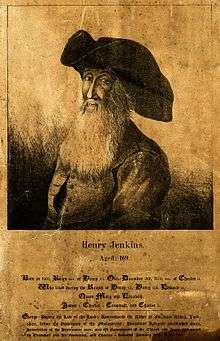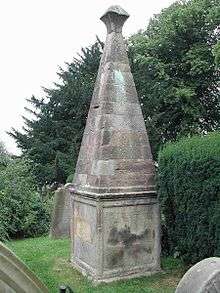Henry Jenkins (supercentenarian)
| Henry Jenkins | |
|---|---|
 Portrait of Henry Jenkins | |
| Born |
Unknown (reportedly in 1501) Ellerton on Swale, Scorton, Yorkshire, Kingdom of England |
| Died |
December 1670 (reputedly aged 169) Bolton-on-Swale, North Yorkshire, Kingdom of England |
| Cause of death | Natural causes |
| Known for | Extreme longevity claim |
Henry Jenkins (buried on 9 December 1670 in Bolton-on-Swale, North Yorkshire) was an English Supercentenarian said to have been 169 years old at his death.[1]
Biography

He claimed to have been born in 1501, although parish registers were not required to be maintained until 1538. It is known that he lived at Ellerton on Swale, Scorton, North Yorkshire,[1] and claimed to have been butler to Lord Coniers, of Hornby Castle, where the Abbot of Fountains was a frequent guest, and "did drink a hearty glass with his Lordship."[2] He later followed the occupation of a fisherman and ended his life begging for alms.[3]
Chancery Court records show that in 1667 Jenkins stated on oath that he was aged "one hundreth fifty and seven or thereabouts ";[1] when asked by the judge which notable battle he remembered, he named Flodden Field, of 1513 and claimed to have carried arrows to the English archers.[4][5]
Although his birth date is undocumented, the date of Jenkins's death is known to within days, as his burial is recorded in the parish register of Bolton-on-Swale as having occurred on 9 December 1670. He is described as "a very aged and poor man".[1] In 1743, in his memory an obelisk was erected in the churchyard, and a plaque made of black marble was placed inside the church;[1] the inscription on it, composed by Dr Thomas Chapman, Master of Magdalene College, Cambridge,[6] reads
| “ | Blush not, marble, to rescue from oblivion the memory of Henry Jenkins, a person obscure in birth, but of a life truly memorable, for he was enriched with the goods of nature if not of fortune, and happy in the duration if not the variety of his enjoyments. And though the partial world despised and disregarded his low and humble state, the equal eye of Providence beheld and blessed it with a patriarch's health and length of days, to teach mistaken man these blessings are entailed on temperance, a life of labour, and a mind at ease. He lived to the amazing age of 169; was interred here, December 6, 1670, and had this justice done to his memory, 1743.[3] | ” |
In 1829, the journal The Mirror of Literature claimed that if Jenkins had followed his legal obligations, during his life he would have changed his religion eight times, between the reigns of Henry VII and Charles II.[7]
T. H. White's science fiction novel The Master: An Adventure Story (1957) compares the eponymous character, aged 150, with Jenkins.
The village of Kirkby Malzeard, North Yorkshire, had a pub named Henry Jenkins after him, until it closed on 29th June, 2008.[8]
References
- 1 2 3 4 5 "Henry JENKINS - and the WASTELL Family, Ann SAVILE, William WASTELL, Scorton, Ellerton, Yorkshire, Sir Richard GRAHAM". freepages.history.rootsweb.ancestry.com. Retrieved 2009-05-07.
- ↑ Hinson, Colin. "GENUKI: A Guide to Richmond in 1833, Yorkshire: Part 12.". Genuki. Retrieved 2009-05-07.
- 1 2 "GENUKI: Bolton On Swale Parish information from Bulmers' 1890.". www.genuki.org.uk. Retrieved 2009-05-07.
- ↑ "Mowbray and the Moors". Wainwright Walks: Coast to Coast. Episode 5. 7 May 2009. BBC Four.
- ↑ "Philosophical Transactions (1683-1775)". 19: 266–268. JSTOR 102306.
- ↑ Andrews, William (2003). Curious Epitaphs. Kessinger Publishing. ISBN 978-0-7661-6726-1.
- ↑ "The Mirror of Literature, Amusement, and Instruction by Various - Project Gutenberg". Project Gutenberg. Retrieved 2009-05-07.
- ↑ Walker, Andy (2008-07-08). "Communities mourn loss of two village pubs". The Northern Echo.
External links
| Wikimedia Commons has media related to Henry Jenkins (supercentenarian). |